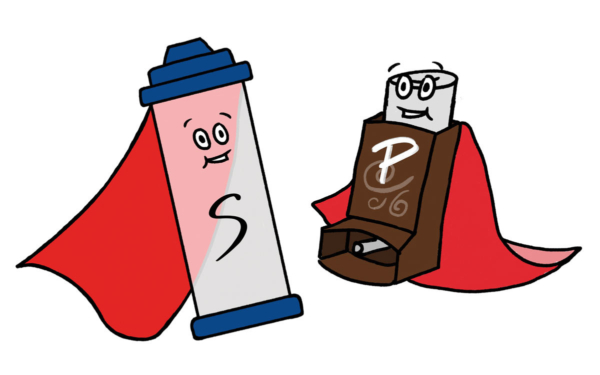Are you a kid with Asthma?
When you think of your asthma, you might think it's just a bit of an annoying cough or wheeze now and again, or you might think taking an inhaler is embarrassing and geeky.
But when you don't look after your asthma, you could have an asthma attack, which can be very dangerous. An asthma attack can make someone very poorly; you may need to go to hospital, and if it's very serious, it can even cause death.
But by taking care of your asthma, we can stop this.
How can you take care of your asthma?
By using your inhalers!
Your inhalers are your superpower. They help you run faster and a few puffs a day makes it easier to play!
Our superheroes, Peter the Preventer and Raya the Reliever, and their sidekicks, Inhaler and Spacer, are here to help you learn how to be super at looking after your asthma!
Remember your Inhalers. Use your preventer every day and carry your reliever everywhere!
You should also:
- Make sure you take your inhalers the right way. Use them the way your doctor or nurse showed you. If you're not sure, ask a parent or guardian to remind you or to make an appointment for you to visit the doctor or nurse again to show you how.
- Learn what to do if you have an asthma attack.
- Tell your friends, teachers and other family members about your asthma so they can help you if you have an asthma attack.
- Ensure you have an Asthma Plan. Carry it with you or take a photo of it on your phone so you always have it.
An asthma attack can strike anywhere, at any time. It could be at school, on a day out, at a sleepover or sports event
Keep reading to find out more about how you can help prevent an asthma attack.

Using inhalers the right way
A lot of films and TV shows show nerdy characters taking their inhalers as the butt of a joke. But taking your inhalers and being aware of what to do if you have an asthma attack is no joke - it could save your life.
Make sure you:
- Use your inhalers
- Use your preventer inhaler (usually brown - like Peter the Preventer!) every day the same way your doctor or nurse showed you, even if your asthma seems okay. This will help to build up protection in your lungs so you will be less likely to have an asthma attack.
- Take your reliever inhaler (usually blue - like Raya the Reliever!) with you everywhere.
- Take your inhalers correctly
- Do you remember when you were told you had asthma and when you got your inhalers? It might have been a very quick appointment with the Doctor, when you were a little kid. It wouldn't be surprising if you've forgotten what they said or what happened!
- You should go to the doctor or nurse once a year to check your asthma. Don't be afraid to ask them questions - they are there to help you!
- If you haven't been to the doctor or nurse about your asthma in a while, ask your parent or guardian if they can take you or help you make sure you're using your inhalers the right way every day.
- Don't rely on relievers
- Raya the Reliever says while your blue reliever inhaler can help you feel better if your asthma is not good, using it too much is not the best way to look after your asthma, and could leave you feeling more poorly over time. Instead, Peter the Preventer says we should use our brown preventer inhaler every day so we don't need the reliever inhaler as much!

What to do if you have an asthma attack
An asthma attack might feel like:
- you are coughing, breathless, or wheezing a lot or a your chest feels tight
- your reliever inhaler is not helping you
- it's hard to speak, eat or sleep because you are breathless
- your breathing is getting faster and it feels like you can’t catch your breath
- your tummy or chest is sore
If you think you're having an asthma attack, you should:
- Tell the people around you like friends, family or a teacher. Don't be afraid or embarrassed to ask for help.
- Sit down in an upright, comfortable position. Try to stay calm.
- Take one puff of your reliever inhaler (usually blue) as you were taught, using any equipment such as a spacer if you need it. Take one puff every 30 to 60 seconds up to 10 puffs.
- If you feel worse or you do not feel better after 10 puffs, ask an adult to call 999 for an ambulance.
- If the ambulance has not arrived after 10 minutes and you don't feel any better, repeat step 2.
- If your symptoms are no better after repeating step 2, and the ambulance has still not arrived, contact 999 again straight away.
If you have an asthma attack and don't have your inhaler with you, get an adult to call 999 straight away.
Make sure you, your family and your friends and teachers know about your asthma and know what to do in the event of an asthma attack.
Making an asthma plan can help with this.
Remember, an asthma attack can strike any where, any time - at school, at a friend's house or during a sports event or other activity. Make sure you are prepared and always have your reliever.
Download our fun Asthma colouring sheet & poster!
-
Asthma Colouring SheetDownload pdf
-
Asthma 'A Few Puffs A Day' A4 Kids PosterDownload pdf
Find out more about asthma below:
-
- Asthma is a condition that constricts the airways – the small tubes that carry into and out of the lungs.
- People with asthma have sensitive airways which react to triggers.
- When an asthma sufferer comes into contact with one or more of these triggers, the muscles around the walls of the airways tighten and they become narrower, making it harder to breathe. The lining of the airways also becomes inflamed and begins to swell.
- Asthma symptoms include breathlessness, wheezing, tight chest or a persistent cough – often at night, early in the morning or during/after activity.
- If you're on the right asthma treatment, your chance of having an attack is greatly reduced.
- Visit a doctor or asthma nurse at least once a year for a check-up and to discuss your treatment.
-
Signs that you may be having an asthma attack include:
- coughing, breathless, wheezing or a tight chest and these symptoms are getting worse
- your reliever inhaler is not helping
- you're too breathless to speak, eat or sleep
- your breathing is getting faster and it feels like you can’t catch your breath
- your peak flow score is lower than normal
- you may also experience a tummy or chest ache
The symptoms will not necessarily occur suddenly. In fact, they often come on slowly over a few hours or days.
-
You should see a GP or asthma nurse within 2 days of leaving hospital, or on the same day if you did not need to go to hospital.
About 1 in 6 people who need to go to hospital for an asthma attack need hospital care again within 2 weeks, so it's important to talk to your doctor or nurse about how you can reduce your risk of future attacks.
Talk to a doctor or nurse about any changes that may need to be made to manage your asthma.
For example, the dose of your treatment may need to be changed or you may need to be shown how to use inhalers correctly.
-
You can help reduce your risk of having an asthma attack.
- Take all of your medicines as prescribed
- Have an asthma review with a doctor or asthma nurse once a year
- Visit your doctor, asthma nurse or pharmacist to check that you're using your inhalers the right way.
- Stay away from things that trigger your asthma where you can, such as dust, ash etc.
- If your asthma symptoms have got worse, or you need to use your reliever inhaler more often than usual, don't ignore this - visit your doctor or asthma nurse.
- Make sure you know what to do if you have an asthma attack.
- Let others know about your asthma - make sure your school, teachers and other family members or friends and friends' parents know and know what to do if you have an asthma attack.
- Create an asthma plan, with the help of your parent and a doctor or nurse. Carry this with you, give copies to teachers, family and friends, put a copy in your bag, or take a photo of it on your phone so you always have it. Make sure it includes:
- which medicines and inhalers you take
- what to do if your asthma is getting worse
- what to do if you have an asthma attack.
-
As we said above, it's important that other people in your life know about your asthma and what to do in an emergency.
An asthma attack can strike anywhere, at any time. It could be at school, on a day out, at a sleepover or sports event.
Make an asthma action plan and showing this to friends, family and teachers who you spend time with - read more about this above.
A good tip is to take a photo of your action plan on your phone or ask your parent or guardian to do this, so you can show or send it to others easily.
-
Asthma videos
Check out our special Asthma episode of our Video Podcast, Heart to Heart
This episode is all about asthma, and the potential dangers if it is not managed properly. Our host Sarah Travers speaks to 9 year old Dara about what it’s like living with asthma, and is also joined by Professor Mike Shields, a respiratory paediatrician with many years of experience of researching and treating patients with difficult asthma, and a board member for Northern Ireland Chest Heart and Stroke.
Check out our videos on:
- The importance of your preventer inhaler
- Taking your inhalers correctly
- What to do if your child has an asthma attack
- Advice from Dr Dara O'Donoghue - Consultant Paediatrician / Senior Clinical Lecturer, Royal Belfast Hospital for Sick Children / QUB Centre for Medical Education

